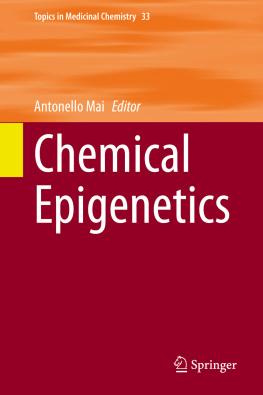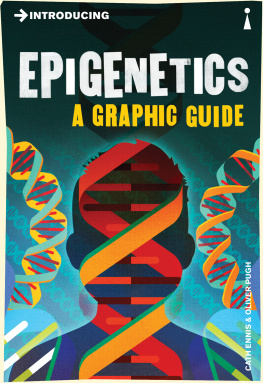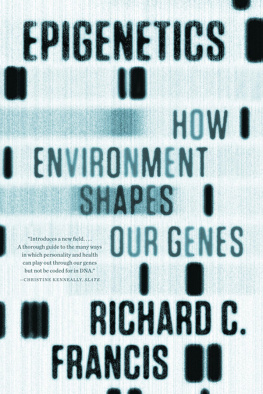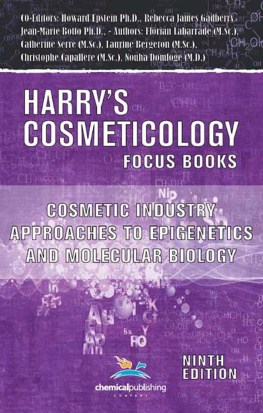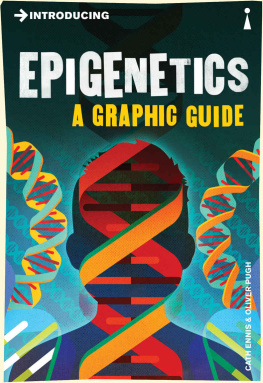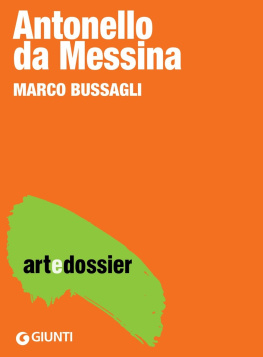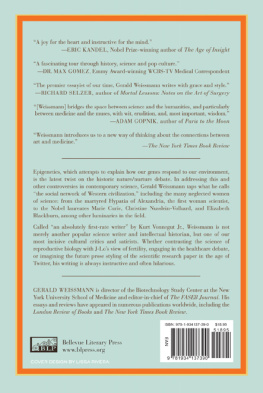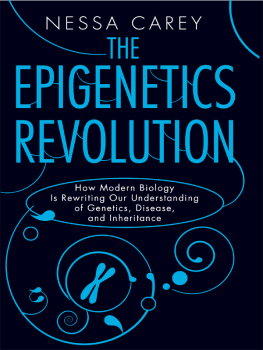Antonello Mai - Chemical Epigenetics
Here you can read online Antonello Mai - Chemical Epigenetics full text of the book (entire story) in english for free. Download pdf and epub, get meaning, cover and reviews about this ebook. year: 2020, publisher: Springer International Publishing, genre: Romance novel. Description of the work, (preface) as well as reviews are available. Best literature library LitArk.com created for fans of good reading and offers a wide selection of genres:
Romance novel
Science fiction
Adventure
Detective
Science
History
Home and family
Prose
Art
Politics
Computer
Non-fiction
Religion
Business
Children
Humor
Choose a favorite category and find really read worthwhile books. Enjoy immersion in the world of imagination, feel the emotions of the characters or learn something new for yourself, make an fascinating discovery.
- Book:Chemical Epigenetics
- Author:
- Publisher:Springer International Publishing
- Genre:
- Year:2020
- Rating:3 / 5
- Favourites:Add to favourites
- Your mark:
- 60
- 1
- 2
- 3
- 4
- 5
Chemical Epigenetics: summary, description and annotation
We offer to read an annotation, description, summary or preface (depends on what the author of the book "Chemical Epigenetics" wrote himself). If you haven't found the necessary information about the book — write in the comments, we will try to find it.
Chemical Epigenetics — read online for free the complete book (whole text) full work
Below is the text of the book, divided by pages. System saving the place of the last page read, allows you to conveniently read the book "Chemical Epigenetics" online for free, without having to search again every time where you left off. Put a bookmark, and you can go to the page where you finished reading at any time.
Font size:
Interval:
Bookmark:
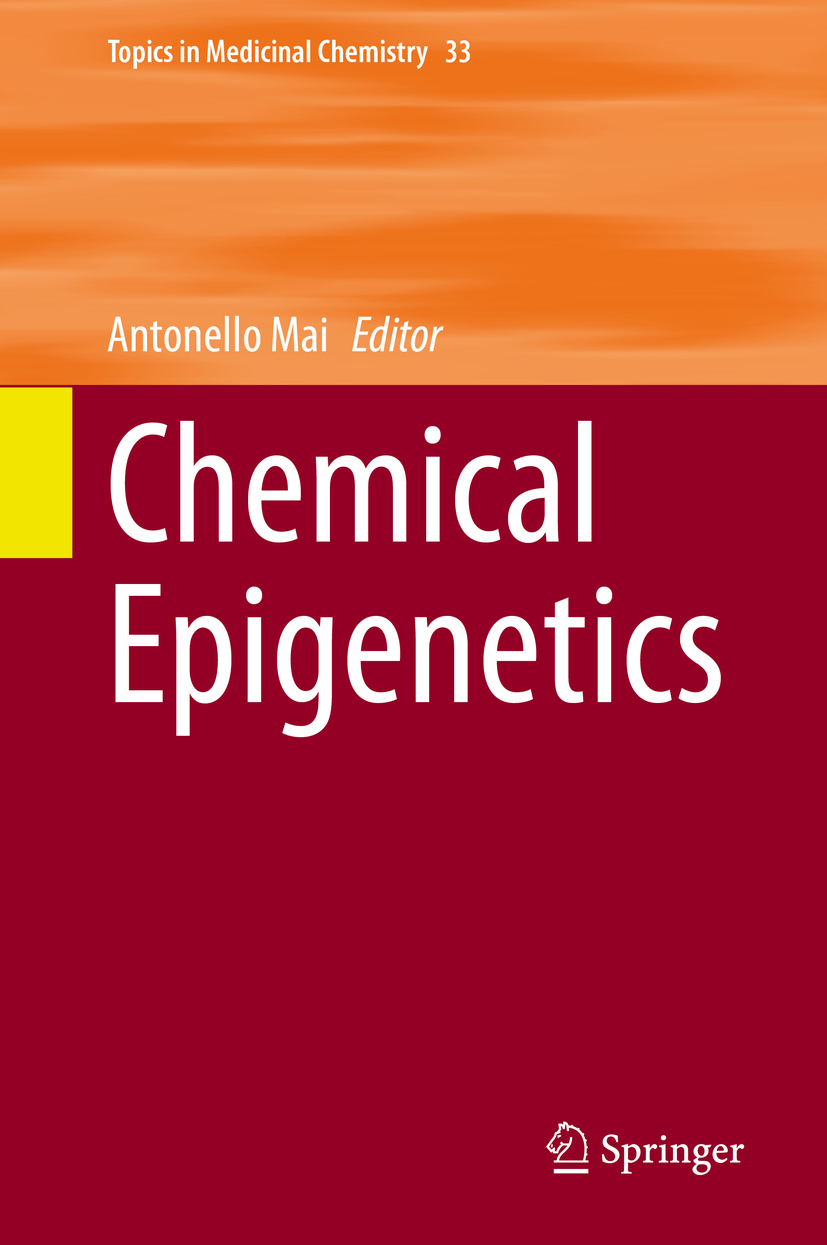
Aims and Scope
Topics in Medicinal Chemistry (TMC) covers all relevant aspects of medicinal chemistry research, e.g. pathobiochemistry of diseases, identification and validation of (emerging) drug targets, structural biology, drugability of targets, drug design approaches, chemogenomics, synthetic chemistry including combinatorial methods, bioorganic chemistry, natural compounds, high-throughput screening, pharmacological in vitro and in vivo investigations, drug-receptor interactions on the molecular level, structure-activity relationships, drug absorption, distribution, metabolism, elimination, toxicology and pharmacogenomics. Drug research requires interdisciplinary team-work at the interface between chemistry, biology and medicine. To fulfil this need, TMC is intended for researchers and experts working in academia and in the pharmaceutical industry, and also for graduates that look for a carefully selected collection of high quality review articles on their respective field of expertise.
Medicinal chemistry is both science and art. The science of medicinal chemistry offers mankind one of its best hopes for improving the quality of life. The art of medicinal chemistry continues to challenge its practitioners with the need for both intuition and experience to discover new drugs. Hence sharing the experience of drug research is uniquely beneficial to the field of medicinal chemistry.
All chapters from Topics in Medicinal Chemistry are published OnlineFirst with an individual DOI. In references, Topics in Medicinal Chemistry is abbreviated as Top Med Chem and cited as a journal.
More information about this series at http://www.springer.com/series/7355

This Springer imprint is published by the registered company Springer Nature Switzerland AG.
The registered company address is: Gewerbestrasse 11, 6330 Cham, Switzerland
Epigenetics doesnt change the genetic code, it changes how thats read. Perfectly normal genes can result in cancer or death. Vice-versa, in the right environment, mutant genes wont be expressed. Genes are equivalent to blueprints; epigenetics is the contractor. They change the assembly, the Structure.Bruce Lipton
Nowadays, science is proving that our body possesses incredible self-healing and self-repairing ability. These mechanisms are markedly influenced by our lifestyle, environmental factors and also our beliefs, thoughts, emotions and intentions. A change in the aforementioned factors can affect or even alter completely the tendency for expression.
During this process, our enormous code base, the DNA, will be read and the manifestation which will be expressed is heavily influenced by epigenetic marks. These marks are either written, read or modified. So we are based not only on plain code, but we are the modifiers of the code through readers, writers and erasers. So we have a profound vibrational effect on our continually evolving genetic code. We are the programmers of the code. DNA activation is our software upgrade.
The specific scientific term epigenetics for these code reading, writing and erasing has been first defined in 1942 by C.H. Waddington. This term has been used in various contexts. Etymologically speaking, epigenetics deals with a precise branch of genetics as the Greek prefix epi means after, post or additionally. Today, in the molecular realm, all three meanings of epi are somewhat proven in the rapidly growing body of literature especially in the last decade dealing with fundamental processes in a living cell which are outside of the classical genetic processes and sources of genetic information like the DNA base pair sequence.
Today researches try to link an observed phenomenon or a disease down to the molecular level. Besides the longer known epigenetic targets such as histone deacetylases or DNA methyltransferases, a whole bunch of new enzymes and enzyme complexes have been discovered in the last 15 years. This book mainly discusses the recent advances in the drug development of epigenetic modulators from a medicinal chemists viewpoint. Modern techniques in biology, biochemistry and chemical biology allow researchers faster than ever to describe and discover new epigenetic players as well as novel functions of old and known ones. Medicinal chemistry plays a fundamental role in the discovery process as it provides not only tools to better understand the function of an epigenetic player but also novel therapy options where aberrant epigenetic mechanisms are involved.
The book comprises 16 chapters. Each chapter includes a short introduction for a single epigenetic target or a target family ranging from structural biology aspects to cell biology and biochemistry. Most of the space is devoted to target modulation, either inhibition or activation. The authors give an insight into the discovery and development of mainly small organic molecules and also peptides influencing epigenetic pathways. Modern aspects of drug design such as new methodologies, ranging from computational approaches, crystallography to structural biology are presented with hands-on examples.
Font size:
Interval:
Bookmark:
Similar books «Chemical Epigenetics»
Look at similar books to Chemical Epigenetics. We have selected literature similar in name and meaning in the hope of providing readers with more options to find new, interesting, not yet read works.
Discussion, reviews of the book Chemical Epigenetics and just readers' own opinions. Leave your comments, write what you think about the work, its meaning or the main characters. Specify what exactly you liked and what you didn't like, and why you think so.

